Filter by
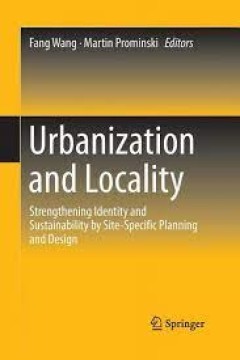
Urbanization and Locality Strengthening Identity and Sustainability by Site-…
Based on a discussion of conflicts in the urbanization process, this book provides theoretical and practical solutions for the preservation and development of urban localities. On the basis of informative case studies, it reveals the similarities and unique aspects of urbanization in Germany and China. The process of urban growth and the future trend of locality and urbanization are also examin…
- Edition
- -
- ISBN/ISSN
- 978-3-662-48494-4
- Collation
- -
- Series Title
- -
- Call Number
- -
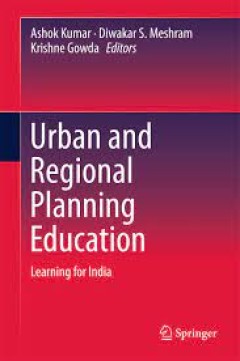
Urban and Regional Planning Education Learning for India
This is the first volume exclusively dedicated to planning education, with a focus on India and learning from global experiences for India. Prior to the 1990s, planning education in India was largely confined to national and local economic concerns. Within a globalized scenario, such pedagogies and theories have become outmoded. With new concerns emerging in planning, new pedagogical tools and …
- Edition
- -
- ISBN/ISSN
- 978-981-10-0608-1
- Collation
- -
- Series Title
- -
- Call Number
- -
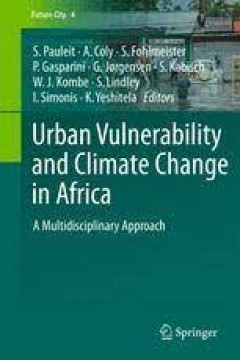
Urban Vulnerability and Climate Change in Africa A Multidisciplinary Approach
Urbanisation and climate change are among the major challenges for sustainable development in Africa. The overall aim of this book is to present innovative approaches to vulnerability analysis and for enhancing the resilience of African cities against climate change-induced risks. Locally adapted IPCC climate change scenarios, which also consider possible changes in urban population, have been …
- Edition
- -
- ISBN/ISSN
- 978-3-319-03982-4
- Collation
- -
- Series Title
- -
- Call Number
- -

Urban Transportation and the Environment Issues, Alternatives and Policy Ana…
The book deals with urban transportation planning in light of environmental sustainability and social equity. It begins with a review of the Indian urban transportation system and the issues surrounding it, and discusses the alternatives and policy directions that are being considered. It examines all the environmental issues arising out of transportation as a sector and assesses the alternativ…
- Edition
- -
- ISBN/ISSN
- 978-81-322-2313-9
- Collation
- -
- Series Title
- -
- Call Number
- -
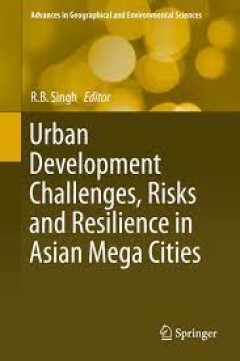
Urban Development Challenges, Risks and Resilience in Asian Mega Cities
In this book, an interdisciplinary research group of faculty members, researchers, professionals, and planners contributed to an understanding of the dynamics and dimensions of emerging challenges and risks in megacities in the rapidly changing urban environments in Asia and examined emerging resilience themes from the point of view of sustainability and public policy. The world’s urban popul…
- Edition
- -
- ISBN/ISSN
- 978-4-431-55043-3
- Collation
- -
- Series Title
- -
- Call Number
- -
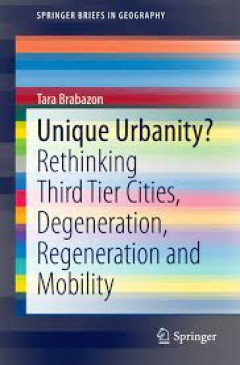
Unique Urbanity? Rethinking Third Tier Cities, Degeneration, Regeneration an…
This book investigates small cities - cities and towns that are not well known or internationally branded, but are facing structural economic and social issues after the Global Financial Crisis. They need to invent, develop and manage new reasons for their existence. The strengths and opportunities are often underplayed when compared to larger cities. These small cities do not have the profile …
- Edition
- -
- ISBN/ISSN
- 978-981-287-269-2
- Collation
- -
- Series Title
- -
- Call Number
- -

Land Issues for Urban Governance in Sub-Saharan Africa
Sub-Saharan Africa faces many development challenges, such as its size and diversity, rapid urban population growth, history of colonial exploitation, fragile states and conflicts over land and natural resources. This collection, contributed from different academic disciplines and professions, seeks to support the UN Habitat New Urban Agenda passed at Habitat III in Quito, Ecuador, in 2016. It …
- Edition
- 1
- ISBN/ISSN
- 978-3-030-52504-0
- Collation
- Pemerintahan/Governance
- Series Title
- Local and Urban Governance
- Call Number
- 352

Building Smart, Resilient and Sustainable Infrastructure in Developing Countries
ABSTRACT Building Smart, Resilient and Sustainable Infrastructure in Developing Countries contains the papers presented at the International Conference on Development and Investment in Infrastructure (DII-2022). The contributions cover a wide range of topics related to infrastructure issues on the African continent: Sustainable Infrastructure Development Smart Infrastructure and Cities Qu…
- Edition
- -
- ISBN/ISSN
- 9781003325321
- Collation
- -
- Series Title
- -
- Call Number
- -

Engaging urban research in policy making: Towards equitable economic growth. …
Cities are considered “engines of economic growth,” yet many cities in the global South struggle to increase productivity and provide significant economic opportunities for their growing populations. There is a need to deepen the knowledge on the links between public goods and services and equitable economic growth and how to support such processes, in policy and strategic terms, locally an…
- Edition
- Ed. 1
- ISBN/ISSN
- 9783798332270, 9783798332270
- Collation
- 130
- Series Title
- -
- Call Number
- 338.9 ENG e

Destination London: The Expansion of the Visitor Economy
- Edition
- Ed. 1
- ISBN/ISSN
- -
- Collation
- -
- Series Title
- -
- Call Number
- -
- Edition
- Ed. 1
- ISBN/ISSN
- -
- Collation
- -
- Series Title
- -
- Call Number
- -
 Computer Science, Information & General Works
Computer Science, Information & General Works  Philosophy & Psychology
Philosophy & Psychology  Religion
Religion  Social Sciences
Social Sciences  Language
Language  Pure Science
Pure Science  Applied Sciences
Applied Sciences  Art & Recreation
Art & Recreation  Literature
Literature  History & Geography
History & Geography